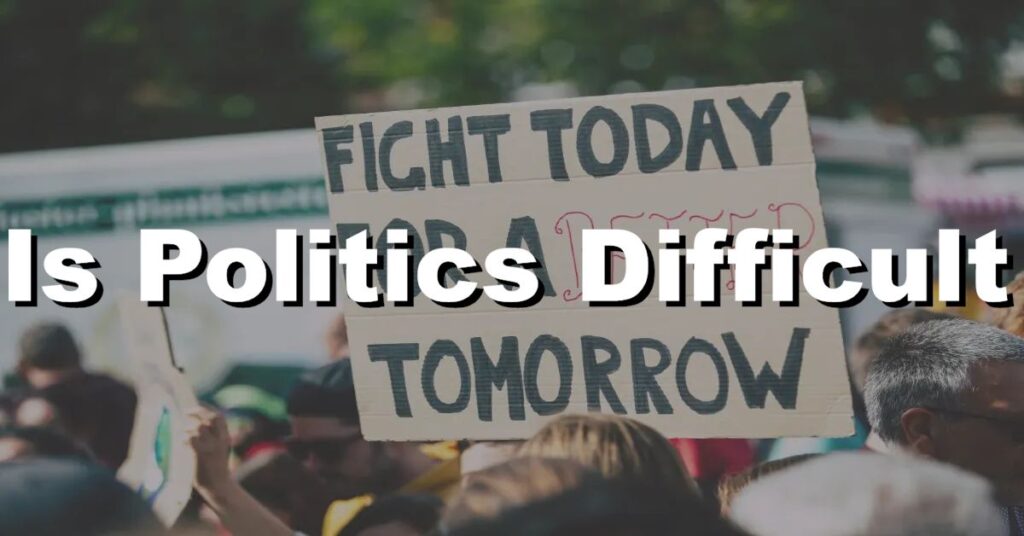Politics can be a complex and challenging field, requiring a deep understanding of history, law, economics, and social issues. This blog post will examine the question of whether politics is difficult, and what skills and knowledge are required to be successful in this field.
Understanding the Complexity of Political Systems
Political systems are intricate and multifaceted structures that govern the functioning of societies. They encompass a wide range of institutions, laws, and processes that shape how power is distributed, decisions are made, and resources are allocated. To grasp the complexity of political systems, it is necessary to explore the different branches of government, the interplay between local, national, and international levels, and the dynamics of political parties and interest groups.
Additionally, understanding the historical, cultural, and socioeconomic contexts in which political systems operate provides valuable insights into their complexities. By studying political systems comprehensively, we can develop a nuanced understanding of how they function, identify areas for improvement, and contribute to meaningful political discourse.
The Impact of Political Polarization on Decision-Making
Political polarization refers to the increasing divide between individuals and groups with opposing political beliefs. It can have a significant impact on decision-making processes within political systems. When polarization is pervasive, it can hinder collaboration, compromise, and the ability to find common ground.
Decision-making becomes more challenging as political actors prioritize ideological loyalty over the pursuit of common goals. This can lead to policy gridlock, stagnation, and an erosion of trust in political institutions. To address the impact of political polarization on decision-making, it is essential to promote open dialogue, foster empathy, and encourage the exploration of shared values and interests.
By bridging divides and finding areas of agreement, decision-making processes can become more inclusive and effective.
The Importance of Critical Thinking in Political Analysis
Critical thinking is a crucial skill in political analysis as it enables individuals to evaluate information, arguments, and policies objectively. Political issues often involve complex and nuanced considerations, and critical thinking helps us dissect and understand them. By critically analyzing political statements, media coverage, and policy proposals, we can discern biases, logical fallacies, and inconsistencies.
This empowers us to make informed judgments and challenge assumptions. Critical thinking in political analysis also involves examining multiple perspectives, seeking reliable sources, and understanding the broader context of political events.
By engaging in critical thinking, we become more active participants in political discourse, better equipped to navigate complex issues, and contribute to well-informed decision-making.
The Relationship Between Political Systems and Social Justice
Political systems have a profound impact on social justice as they shape the distribution of power, resources, and opportunities within societies. The design of political systems can either promote or hinder social justice goals. Systems that prioritize equality, inclusivity, and the protection of human rights contribute to a more just society.
On the other hand, systems that perpetuate inequality, marginalization, and discrimination can exacerbate social injustices. By analyzing the ways in which political systems allocate resources, address systemic biases, and provide avenues for citizen participation, we can assess their impact on social justice.
Understanding this relationship is essential for advocating for equitable policies, holding political systems accountable, and working towards a fairer and more just society.
How to Simplify Political Issues for Greater Understanding
Simplifying political issues is crucial for enhancing understanding and engaging a broader audience in political discourse. Complex topics can be overwhelming, leading to apathy or confusion. Breaking down political issues into digestible components, using clear and concise language, and providing relatable examples can make them more accessible.
Visual aids, storytelling techniques, and analogies can also simplify complex concepts and bridge the gap between theory and practice. It is important to avoid oversimplification or sacrificing accuracy in the process. By simplifying political issues without sacrificing essential nuances, we can foster greater understanding, encourage diverse participation, and make political discourse more inclusive.
Conclusion
In conclusion, politics can certainly be difficult to navigate, particularly for those who are not familiar with the political system or its nuances. However, with education and engagement, anyone can learn to be politically active and make a difference in their community.

